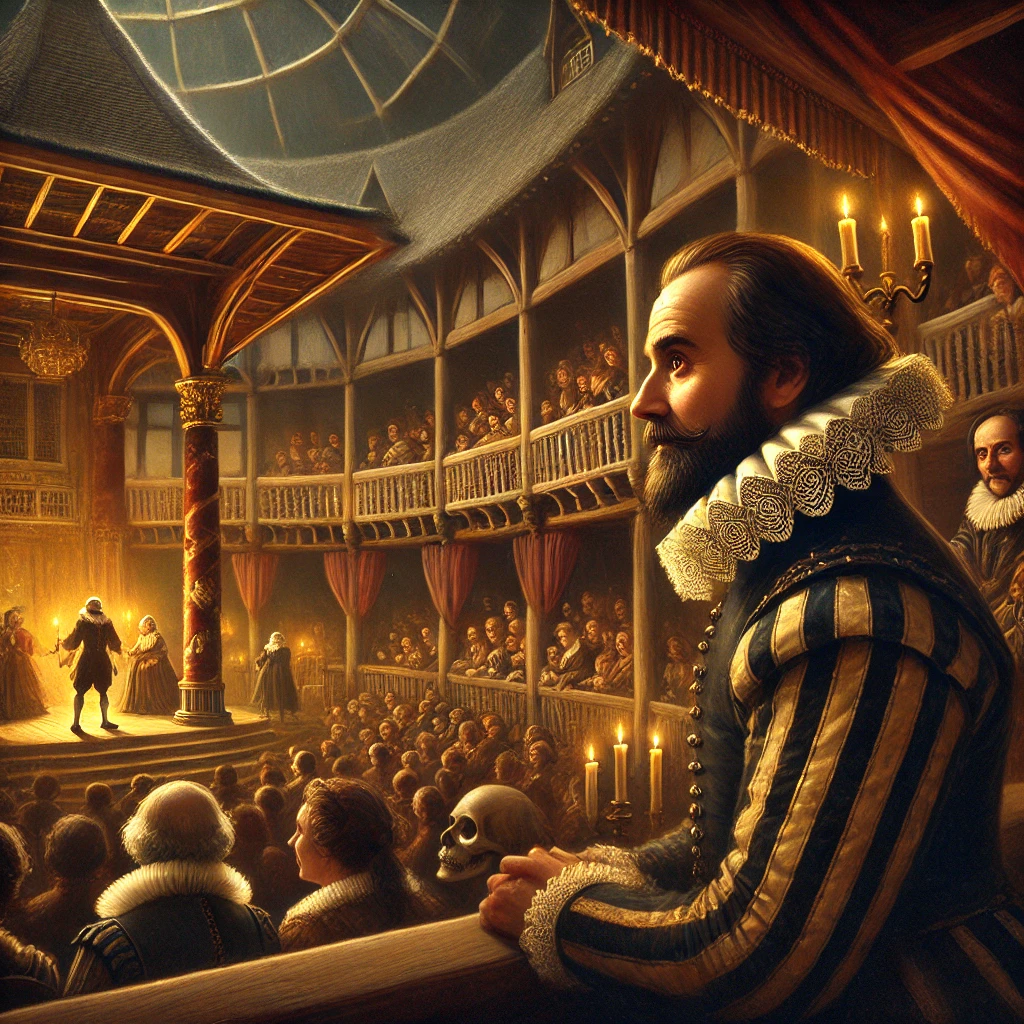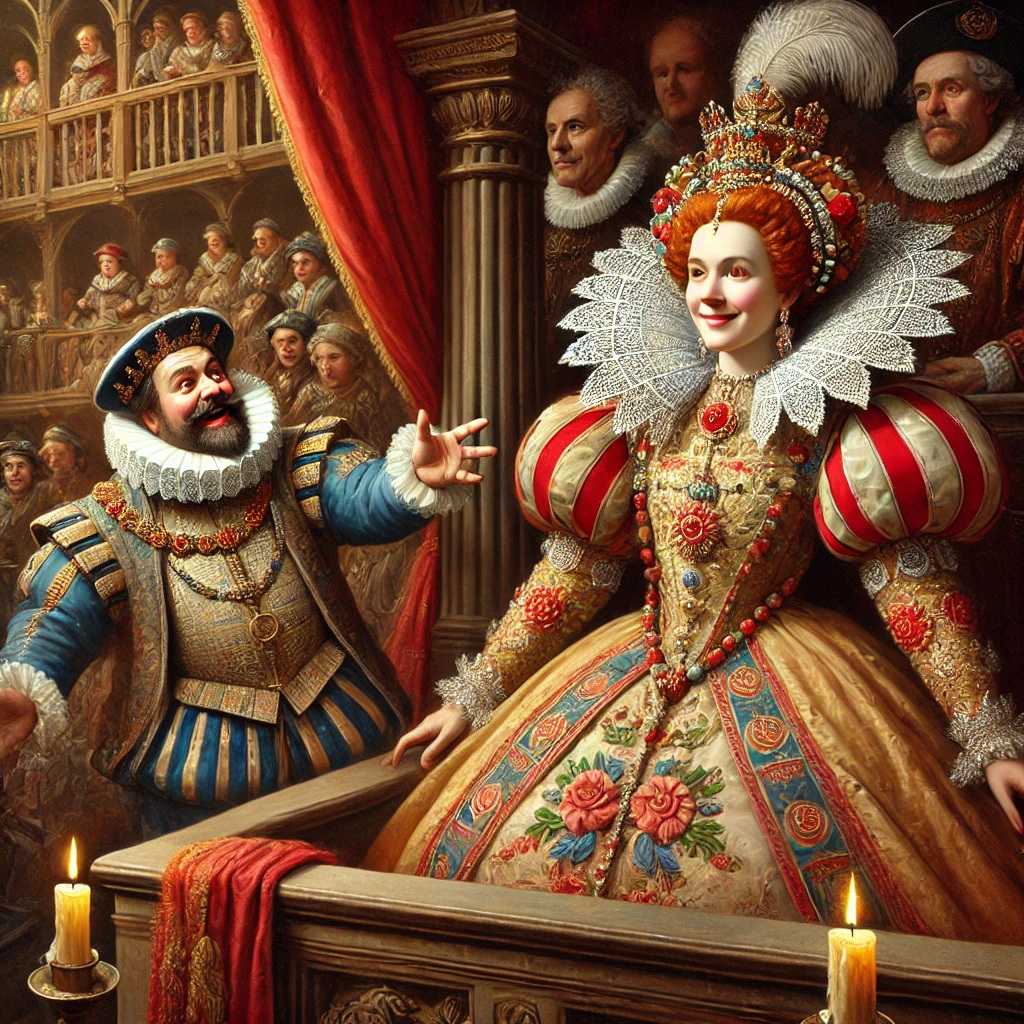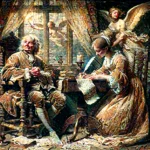By ABS, The Literary Scholar
A.K.A. The Scroll-Bearer of British Verse, Who Knows Will Was Extra Before Extra Existed
The Curtain Rises on Stratford’s Favourite Overachiever
Let’s get this straight: Shakespeare wasn’t just a playwright. He was the entire genre.
He gave us murderous kings, cross-dressing lovers, mooning poets, ghost dads, and a fool who was wiser than all the nobles in the room—all in language so rich, you could butter your toast with it.
“All the world’s a stage,” he said—
But really?
Will just wanted every stage to be his.
Born in 1564 in Stratford-upon-Avon, Shakespeare was the kind of kid who probably couldn’t sit still in class because he was too busy composing monologues in his head. We don’t know much about his education, but we do know he could out-rhyme anyone and turn emotional damage into poetry like no one else.
He moved to London, became a playwright, actor, part-owner of a theatre, and soon had his name whispered through candlelit taverns and royal courts alike.
And then, he changed everything.
Sonnets, Sighs, and Subtext
Before we dive into sword fights and mistaken identities, let’s talk Shakespeare’s sonnets—because this man didn’t just master drama, he practically redefined literary thirst traps.
There are 154 sonnets, most of them dedicated either to:
-
A mysterious young man (the Fair Youth)
-
A mysterious dark lady (the Anti-Muse)
-
Or a mysterious rent payment (because let’s be real, poets gotta eat)
Some iconic ones:
“Shall I compare thee to a summer’s day?”
Translation: You’re hot. But, like, also immortal because I wrote this.
“Let me not to the marriage of true minds admit impediments…”
Basically: If your love ends because someone gained weight or forgot to text back, it wasn’t real love.
His sonnets explore beauty, time, obsession, betrayal, immortality, and sometimes a confusing blend of all five.
TL;DR? Shakespeare flirted harder through verse than anyone on Bumble.
Tragedies—Where Everyone Dies But the Dialogue Slaps
Now let’s get bloody. Because if there’s one thing Shakespeare loved more than a soliloquy, it was a slow, poetic descent into madness.
Here are the Four Pillars of Tragic Meltdown:
1. Hamlet — The Prince of Procrastination
Fatal flaw: Indecision
He sees his dad’s ghost, learns his uncle is a murderer, and instead of acting… he delivers monologues. Epic monologues.
“To be or not to be…”
Sir, respectfully, pick one.
2. Macbeth — Blood and Ambition: The Home Edition
Fatal flaw: Over-ambition (and a questionable marriage counselor)
He murders a king because three witches and one bold wife told him to, and then spirals into guilt, hallucinations, and full-on chaos.
“Is this a dagger which I see before me?”
It is, Macbeth. And it’s got your name on it.
3. King Lear — Family Feud: Medieval Edition
Fatal flaw: Ego
Divides his kingdom based on who loves him most. Spoiler: bad idea. Ends up in a storm, yelling at clouds and realizing maybe he should’ve read the family group chat.
4. Othello — Trust Issues and Toxic Friends
Fatal flaw: Jealousy
Manipulated by Iago (who’s basically a human Reddit thread), Othello ends up murdering the one woman who actually loved him.
A tragic lesson in why emotional intelligence matters.
And yet, despite all the death, blood, and body count—the language is heartbreakingly gorgeous.
“Good night, sweet prince.”
“Out, damned spot!”
“Blow, winds, and crack your cheeks!”
It’s tragedy—but make it literary couture.
Bonus Tragedy: Romeo and Juliet — When Teens Fall in Love and Everybody Dies
Let’s not forget the play that launched a thousand bad decisions and one Leonardo DiCaprio film.
Romeo and Juliet is less a love story and more a cautionary tale about:
-
Lack of communication
-
Dramatic teenagers
-
And the dangers of marrying someone you just met at a party
“These violent delights have violent ends.”
— a quote, a prophecy, and a relationship warning label
Romeo drinks poison. Juliet stabs herself. The audience weeps.
Meanwhile, Shakespeare mic-drops his quill and mutters, “Bet they’ll still quote this in high school plays forever.”
And they do.
Because despite the melodrama, the language is iconic.
Because every generation needs a tragic love story they think is romantic until they actually read it.
Comedies—Cross-dressing, Misunderstandings, and Sassy Women
Shakespeare’s comedies are less haha, more “Wait, did that girl just pretend to be a boy who fell in love with another girl who didn’t know she was a girl pretending to be a boy?”
Answer: Yes. Frequently.
Key Ingredients of a Shakespearean Comedy:
-
Mistaken identities
-
Cross-dressing heroines
-
Witty wordplay
-
Fools who are wise, nobles who are dumb
-
Happy endings with sudden weddings
Much Ado About Nothing
Benedick and Beatrice: the original enemies-to-lovers trope.
Their flirt fights could give any rom-com script a run for its money.
“I do love nothing in the world so well as you—is not that strange?”
Only Shakespeare could make denial this romantic.
Twelfth Night
Viola dresses as a boy. Olivia falls in love with her. Or him. Or…
It’s a romantic Rubik’s Cube of identity and attraction.
As You Like It / All’s Well That Ends Well / The Merchant of Venice / Merry Wives of Windsor
Recurring themes:
-
Women outwitting men
-
Disguises
-
Justice being poetic
-
Fools speaking the truth
-
Nobles being played like harps
And Falstaff—oh, Sir John Falstaff!
A drunken, boastful, ridiculous knight who was so popular the Queen herself reportedly demanded he appear in another play (The Merry Wives of Windsor).
Histories, Haters, and the Marlowe Conspiracy
While the tragedies bleed and the comedies flirt, Shakespeare’s History plays deal with:
-
Crown obsession
-
Bloody battles
-
Betrayals with flair
-
Rants by kings that last longer than your average political debate
Standouts:
-
Henry IV & V (a royal glow-up)
-
Richard III (drama personified)
-
Julius Caesar (technically a Roman history, but dripping with betrayal and perfect meme-worthy quotes)
“Et tu, Brute?”
The most elegant way to say “You too, bro?”
Wait—Did Shakespeare Steal Marlowe’s Style?
The Christopher Marlowe theory is deliciously scandalous:
-
Marlowe died young (stabbed in the eye—how poetic)
-
Some say Shakespeare completed Marlowe’s unfinished plays
-
Others whisper he copied his style, and had Marlowe lived, we might be studying Kit instead of Will
But here’s the thing: Shakespeare borrowed everything—plots, characters, old stories, Roman history—and turned it into verbal gold.
Shakespeare may have borrowed the plot,
But he owned the punctuation.
The Man, the Myth, the Bard Who Left Early
Just when Shakespeare had dominated the theatre, made kings laugh, and coined half the English language—he left.
He retired to Stratford, lived out his days comfortably, and left the world guessing.
“The rest is silence.” — Hamlet
And so it was.
But what he left behind?
-
39 plays
-
154 sonnets
-
Countless phrases we still use
-
A legacy so strong, his name literally became the word for greatness
“He was not of an age, but for all time.” — Ben Jonson
And we’re still quoting him, misquoting him, and falling in love with his words.
Final Scroll:
The theatre dims, the curtain falls, but the Bard still whispers from every bookshelf.
Signed,
ABS, The Literary Scholar
ABS unrolls the parchment one last time, smiles at the lingering spotlight, and vanishes stage left—somewhere between prose and poetry.
Curtains drawn, echoes linger, and the Bard’s voice still ripples through time.
Signed,
ABS, The Literary Scholar
Who exits stage left—quill in hand, soliloquy unfinished.
By ABS, The Literary Scholar
A.K.A. The One Who Believes Milton Probably Dreamed in Iambic Pentameter
Share this post / Spread the witty word / Let the echo wander / Bookmark the brilliance



